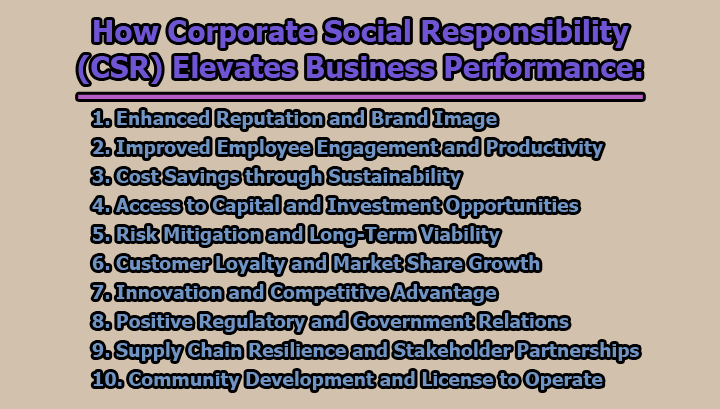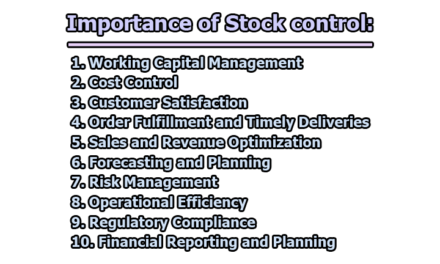How Corporate Social Responsibility (CSR) Elevates Business Performance:
Corporate Social Responsibility (CSR) has evolved from a mere philanthropic endeavor to a strategic imperative for businesses worldwide. In recent years, organizations have recognized the profound impact CSR can have on their overall performance. In this article, we will explore how Corporate Social Responsibility (CSR) elevates business performance, highlighting ten key points that underscore the significance of integrating social responsibility into corporate strategies.
1. Enhanced Reputation and Brand Image:
CSR serves as a powerful tool for building and enhancing a company’s reputation and brand image. In today’s socially conscious consumer landscape, customers are increasingly inclined to support businesses that actively contribute to societal well-being. Companies that embrace CSR initiatives demonstrate a commitment to ethical practices and community welfare, earning the trust and respect of their target audience.
A positive reputation is a valuable asset that can set a company apart in a crowded market. Consumers are more likely to choose products or services from a socially responsible brand, even if it means paying a premium. Moreover, in the age of social media and instant communication, positive experiences and socially responsible actions are shared widely, amplifying the reach of a company’s positive image.
A strong brand image built on CSR not only attracts customers but also appeals to stakeholders such as investors, partners, and employees. These stakeholders are increasingly considering a company’s values and commitment to social responsibility when making decisions. Therefore, by enhancing its reputation through CSR, a company lays the foundation for sustained success and competitive advantage.
2. Improved Employee Engagement and Productivity:
Employee engagement is a critical factor in organizational success, and CSR plays a pivotal role in fostering a sense of purpose and pride among employees. When employees believe that their work contributes to a greater societal good, they are more likely to be motivated, committed, and engaged in their roles.
Companies that prioritize CSR initiatives create a positive work environment that goes beyond financial incentives. Employees feel a sense of alignment with the company’s values, leading to increased job satisfaction and higher morale. This, in turn, reduces turnover rates, as employees are less likely to seek employment elsewhere when they feel a strong connection to the company’s mission.
Furthermore, engaged employees are more productive and creative. They are willing to go the extra mile, contribute innovative ideas, and collaborate effectively with their colleagues. In essence, CSR serves as a catalyst for building a motivated and productive workforce, contributing to overall organizational success.
3. Cost Savings through Sustainability:
Sustainability is a key component of CSR, and companies that integrate sustainable practices into their operations often realize significant cost savings. Sustainable initiatives, such as energy-efficient technologies, waste reduction programs, and responsible resource management, not only benefit the environment but also contribute to the company’s bottom line.
For example, adopting energy-efficient technologies reduces utility costs over time, while waste reduction initiatives minimize disposal expenses. Moreover, responsible resource management, such as using recycled materials, not only aligns with CSR goals but can also lead to cost-effective procurement.
These cost savings contribute directly to the company’s financial health. Additionally, as consumers and investors increasingly prioritize environmentally conscious businesses, the cost savings achieved through sustainability efforts can be leveraged to strengthen the company’s reputation and market position.
4. Access to Capital and Investment Opportunities:
Investors are becoming more discerning, and many are incorporating CSR performance into their investment decisions. Companies with strong CSR initiatives are often viewed favorably by socially responsible investors, opening up access to a broader pool of capital.
Investors recognize that a commitment to CSR is indicative of a company’s long-term vision, ethical values, and risk management capabilities. Consequently, companies that prioritize CSR may find it easier to attract investment, secure funding, and explore diverse investment opportunities.
Moreover, as sustainable and socially responsible investing continues to grow, companies that align with environmental, social, and governance (ESG) criteria may experience higher valuations and lower capital costs. This creates a mutually beneficial cycle where a commitment to CSR not only attracts investors but also contributes to financial sustainability.
5. Risk Mitigation and Long-Term Viability:
Proactively addressing social and environmental issues through CSR initiatives helps companies mitigate various risks. In an era where public scrutiny is intense and regulatory landscapes are evolving, businesses that integrate CSR into their strategies are better positioned to navigate challenges and uncertainties.
By identifying and addressing potential risks associated with environmental impact, labor practices, or supply chain vulnerabilities, companies can preemptively implement measures to mitigate these risks. This proactive approach not only minimizes the likelihood of legal and reputational issues but also demonstrates resilience and adaptability in the face of changing circumstances.
Furthermore, CSR can enhance a company’s ability to anticipate and respond to regulatory changes. Governments worldwide are increasingly recognizing the role of businesses in addressing societal challenges, and companies that demonstrate a commitment to CSR may enjoy positive regulatory relations. This, in turn, contributes to a favorable operating environment and reduces the regulatory and legal risks faced by the company.
6. Customer Loyalty and Market Share Growth:
CSR has a profound impact on customer loyalty and market share growth. In an era where consumers are increasingly conscious of the social and environmental impact of their purchasing decisions, companies that actively engage in CSR initiatives are better positioned to build strong and lasting relationships with their customer base.
Customers are more likely to support businesses that align with their values and contribute positively to society. By integrating CSR into their business strategies, companies create a unique selling proposition that goes beyond the functional attributes of their products or services. This emotional connection fosters customer loyalty, with consumers choosing to support brands that share their commitment to social and environmental responsibility.
Satisfied and loyal customers not only contribute to repeat business but also become brand advocates, spreading positive word-of-mouth and influencing others to choose the company over competitors. This advocacy, coupled with a strong reputation for CSR, directly contributes to market share growth and strengthens the company’s position in the market.
7. Innovation and Competitive Advantage:
CSR stimulates innovation by encouraging companies to find sustainable solutions to societal challenges. The pursuit of environmental and social goals often drives organizations to think creatively and develop innovative products, services, and business models. This focus on innovation not only benefits the company but also contributes to broader efforts to address global challenges such as climate change and social inequality.
Companies that prioritize CSR are perceived as industry leaders and innovators, gaining a competitive advantage in the market. Consumers, investors, and other stakeholders are increasingly attracted to businesses that demonstrate a commitment to addressing pressing social and environmental issues. This positive perception enhances the company’s brand equity and distinguishes it from competitors, contributing to sustainable long-term success.
Moreover, embracing CSR fosters a culture of continuous improvement and adaptability within the organization. Companies that prioritize innovation through CSR are better equipped to navigate evolving market trends, technological advancements, and changing consumer preferences, ensuring their relevance and competitiveness in the long run.
8. Positive Regulatory and Government Relations:
Governments worldwide are recognizing the pivotal role of businesses in addressing societal challenges. Companies that actively participate in CSR initiatives often enjoy positive relations with regulatory bodies and government agencies. This positive engagement can lead to a more favorable regulatory environment, with governments acknowledging and supporting companies that contribute positively to society.
By aligning with government priorities and demonstrating a commitment to ethical business practices, companies can build a positive rapport that extends beyond regulatory compliance. This constructive relationship with authorities can result in reduced regulatory scrutiny, expedited approvals, and potential government support for CSR initiatives.
Positive regulatory and government relations contribute to a stable operating environment, reducing the likelihood of legal challenges or regulatory hurdles. This, in turn, enhances the company’s ability to focus on its core business activities and pursue its CSR goals without unnecessary impediments.
9. Supply Chain Resilience and Stakeholder Partnerships:
CSR extends beyond the boundaries of individual companies to encompass the entire supply chain. Integrating CSR principles into the supply chain ensures that suppliers adhere to ethical and sustainable practices. This not only promotes transparency but also enhances the resilience of the supply chain, reducing the risk of disruptions due to issues such as ethical controversies or environmental disasters.
Furthermore, forming partnerships with stakeholders who share similar values is a key aspect of successful CSR implementation. Collaborative efforts with suppliers, distributors, NGOs, and local communities create a network of support that goes beyond the immediate business operations. Such partnerships contribute to shared goals, mutual growth, and the development of sustainable practices throughout the entire business ecosystem.
By building resilient supply chains and fostering stakeholder partnerships, companies enhance their ability to weather external shocks and adapt to changing market conditions. This collaborative approach contributes to the overall sustainability and success of the business while positively impacting the broader community.
10. Community Development and License to Operate:
Engaging in CSR initiatives that benefit local communities is not just a moral imperative but a strategic move that ensures the company’s long-term viability. By actively participating in community development projects, companies build a positive relationship with the communities in which they operate, earning the “license to operate.”
A strong connection with the local community is invaluable, especially in industries where public sentiment plays a significant role. Companies that contribute to the well-being of the community through initiatives such as education, healthcare, or environmental conservation are more likely to be accepted and supported by residents.
The “license to operate” is not only about adhering to legal requirements but also about being a responsible and valued member of the community. This positive relationship can result in increased customer loyalty, positive word-of-mouth, and a supportive environment for business operations. Companies that prioritize community development through CSR initiatives demonstrate a commitment to being responsible corporate citizens, contributing to the overall social fabric in which they operate.
In conclusion, the ten points outlined above illustrate the multifaceted impact of Corporate Social Responsibility on business performance. From building a positive reputation and enhancing employee engagement to fostering innovation, mitigating risks, and contributing to community development, CSR is a strategic imperative that goes beyond philanthropy. Embracing CSR is not just about doing good; it’s about creating a sustainable and resilient business that thrives in a rapidly evolving global landscape.

Library Lecturer at Nurul Amin Degree College










